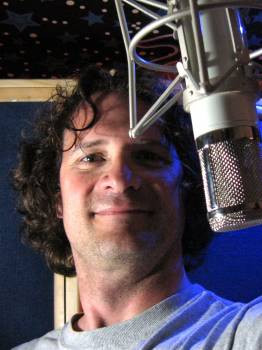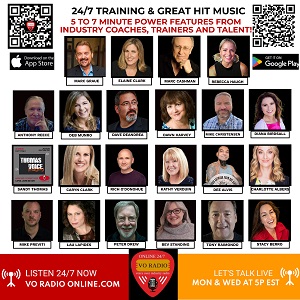|
10 Tips Help Frequent Fumblers
Avoid Costly Pick-Ups & Editing
 By Dan Friedman By Dan Friedman Audio Engineer, Producer & Voice Talent
In my role as a voice over producer, I was asked by one of our account managers which of the two voice over talents the client had chosen would be better for a 12-minute narration.
"Talent AĒ and "Talent BĒ are both seasoned veterans and have great voices and deliveries.
The difference is that "Talent BĒ requires a great deal of time for editing pick-ups, mistakes and fumbled words. On a project this long, the additional time that will be required to work with "Talent BĒ will be costly to the client.
Needless to say, for a job like this, I recommended "Talent A.Ē
PICK-UPS ARE COSTLY
People with stage and live performance experience know that there is only one chance to get it right. Film actors know that film is expensive and multiple takes could become costly.
People who have been in the voice over industry for more than 15 years will probably remember working with tape. Tape was also expensive, and editing with it was much more difficult and time consuming then digital editing is today.
So while many of these expenses and difficulties are less of an issue today, frequent pick-ups are still a tremendous waste of time and can be costly for the client and (as you read in the introduction) for the talent, as well.
NAIL IT EARLY
There is no question that some scripts and styles of reads can be difficult.
Fast disclaimers and long scientific or medical narrations can be extremely tricky.
But professional voice talent should not struggle with a typical script, such as one for a grocery store, car dealership, restaurant or bank.
If the script is written well, a professional voice talent should have little trouble delivering it.
TIME-CONSUMING EDITING
It is frustrating when a voice over "talentĒ is unable to get through more than a few sentences without multiple pick-ups ... and donít even get me started on the editing.
Editing should be a tool for choosing the perfect nuances, eliminating clicks, noises and other anomalies, removing breaths and trimming a read so that it will fit into time constraints.
It should not be required to simply get a complete read.
The edit desk is not supposed to look like a ransom note (thank you, Amy Snively, for that analogy).
BEST CUSTOMER SERVICE
This is a customer service issue. The time it takes to edit an audio full of pick-ups, mistakes, and fumbles can be costly to the client.
Voiceoverists who are frequent fumblers require additional time for both recording and editing.
THE EDITOR'S JOB
Even on straightforward editing jobs, clients as well as voice over talent are often best served using professional audio engineers and editors to edit their audio quickly.
When multiple pick-ups are involved, the editor's speed is even more important.
But even more critical than speed is the engineerís ability to make disconnected reads sound cohesive (deliveries lacking cohesion can occur easily when multiple pick-ups are involved).
His or her editing experience often produces better results than the client or talent can achieve when trying to edit the audio themselves.
TO AVOID MISTAKES ...
Everyone makes mistakes. It is a fact of life.
However, if you as a voice over talent routinely have more pick-ups in your reads than an auto dealership in the south has pick-up trucks, then (like those trucks) youíve got work to do.
Here are some tips ...
1. See Clearly? Get your eyes checked regularly. This should be obvious. If you canít see the script, how can you possibly read the script?
2. Prepare. Clients donít always send the script in advance. But when they do, as a professional voice talent you have a responsibility to prepare. Read the script, mark it up appropriately and ask questions (if you have any) before you start recording.
3. Mentally focus. Do whatever you need to do to prepare yourself to perform the read you are about to deliver.
Deep cleansing breaths, reading silently to yourself for a couple of seconds, imagine to whom you will communicate the message - whatever works for you.
Once you are focused, stay focused.
4. Donít try to memorize. Donít take your eyes off the page and think youíll remember what was there. Read the words in front of you.
5. Anticipate. Especially if you didnít get the script in advance. Anticipate what is coming next based on the words, sentence structure and your experience.
6. Break it up. Break the word or phrase up into smaller components and then pull it together as you repeat it.
7. Repetition. If a word or phrase is difficult for you to say, repeat it over and over again until you get comfortable with it.
8. Adjust your speed. Subtle changes in the speed of your delivery can make it easier to say difficult words or phrases.
9. Practice. Practice reading, out loud and fluently, all of the time.
10. Relax. This is your job. It is what you do. Relax and make it happen.
Remember, this is a customer service issue. Voice talent who read fluidly, communicate effectively and require minimal editing provide a better experience for their clients.
They also save the client valuable time and money.
ABOUT DAN ...
Dan Friedman is a voice talent who began as an audio engineer in 1994, working with live sound and then in radio and recording studios. He has been a producer with ProComm Voices for over 10 years, and since 2005, a voice talent with a growing list of of clients including radio and television campaigns. His comprehensive book, Sound Advice - Voiceover From An Audio Engineer's Perspective, provides an excellent foundation for understanding voice over audio and equipment.
Email: danfriedmanvo@hotmail.com Sound Advice book: Click Here
|
|
|
With Sean Daeley and Paul Stefano - check it out!
For essential voice-over business strategies
Inspiring interviews help your VO career
Get your bi-weekly dose here ... all things VO!
As of the NEW website launch, 03/22/2012







.png)


Preparation is oh so important, and I still find it strange that I do not receive copy at least hours before an upcoming ISDN session. Nine times out of 10 I get it as the session begins.
I want to help the clients in any way I can, so they will use me more. But so many sabotage themselves by not allowing us to prepare. If you fall into this description - please let US help YOU.
Thanks, Dan, for your insightful article.
I often use driving a car as an example. When you're just learning, you really have to think where and when to place your hands, feet, eyes, and mind. With experience, all these considerations become instantaneous, transparent, and fluid.
What a professional voice actor does is no different. While reading, my eyes are constantly scanning back and forth, setting up the end of the current sentence, looking for context clues in the next sentence so that the one I'm reading now will make sense, looking at my director/sound technician for cues, etc. Just like looking through the windshield, at the rear view and side mirrors, speedometer ... you get the idea.
Many times I would hear a stumble or mispronunciation in my head that the producer or director would have no problem with. Yet it would trigger my mind to wander and lose focus, wondering if I should do a retake. That lack of focus would then make things even worse. Start doing it at the beginning of a session and it's a recipe for a very frustrating session for all involved.
It's hard to turn off that inner voice, but it can be done. Now unless its a blatant stumble or mispronunciation i let the producer tell me when to retake. And this invariably resulst in faster sessions, a relaxed talent and far fewer pickups.